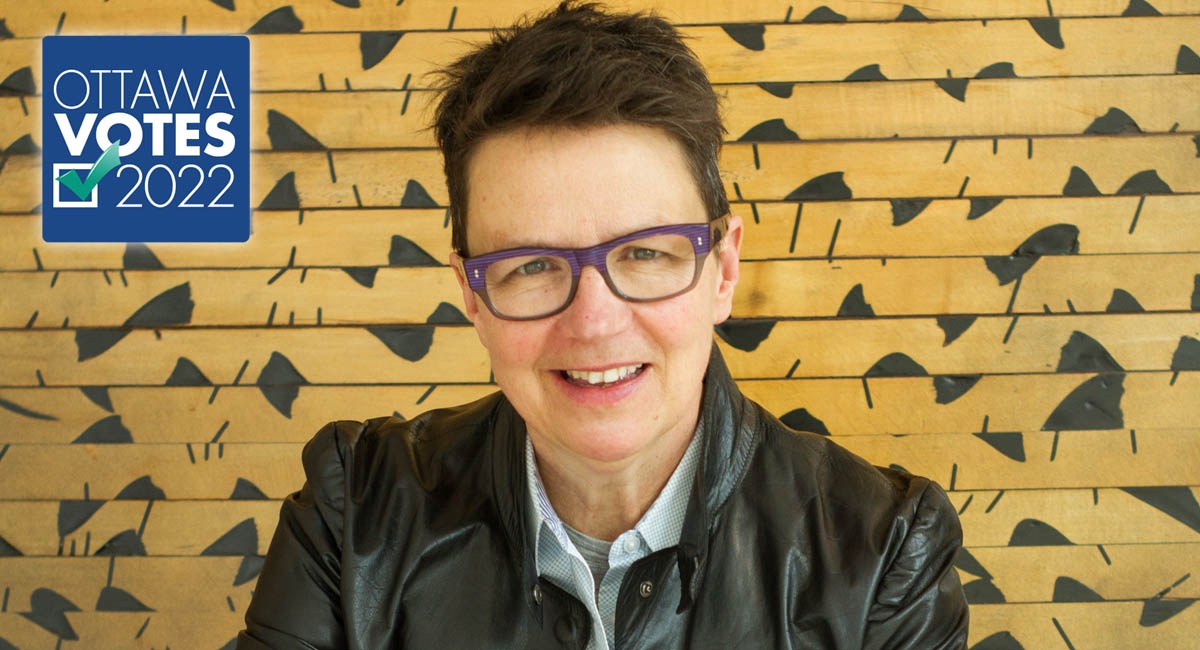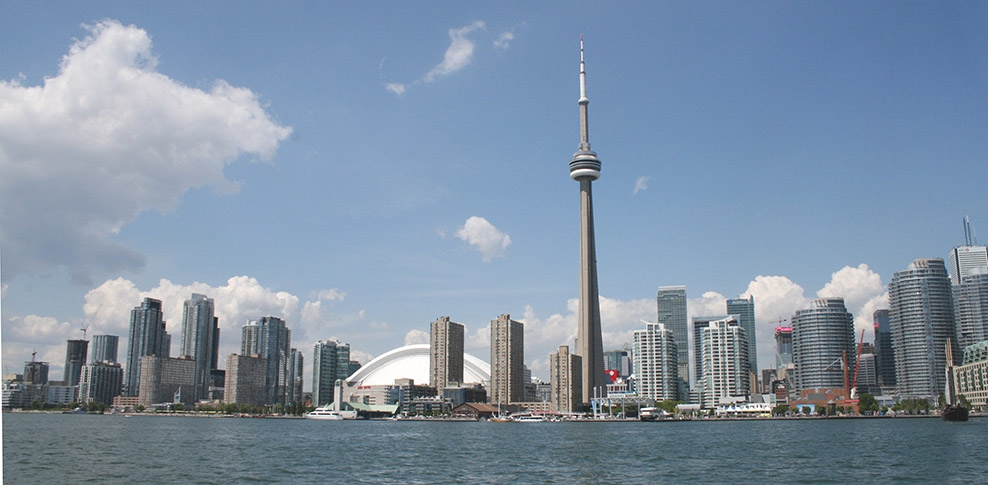
Catherine McKenney: Ottawa’s “boots on the ground” councillor runs for mayor
PHOTO: Neon Lilith Photography
Catherine McKenney has been representing the citizens of Somerset Ward since 2014. Judging by how well they performed in the 2018 election, McKenney is well-liked by their community; Ottawa’s first non-binary councillor was re-elected in 2018 with a staggering 76.6 per cent of the vote.
This immense popularity is easy to understand when talking to the seasoned municipal politician. Their friendly demeanour and can-do attitude radiates and is infectious. Ottawa Life Magazine recently spoke to McKenney on the upcoming 2022 mayoral race, the first in 12 years where Jim Watson will not be on the ballot.
McKenney is running against fellow councillor Diane Deans and former mayor Bob Chiarelli. The race could be anybody’s at this point, but Catherine McKenney shows they have a strong vision for the city.
OLM: You recently got a fair amount of coverage for your on-the-ground approach to the convoy occupation downtown. You were seen talking to truckers and informing them of the class-action suit while also canvassing the neighbourhood. Would it be fair to say you’ve got a boots-on-the-ground approach to municipal politics?
Catherine McKenney: Oh, absolutely. It’s the only way I understand how to do my job—that is to be out there with people, talking to people, focusing on solutions, and making them happen. I’ve just never been a policy person. Policy is exceptionally important, and I know what it does in terms of making positive change, but it’s just not how I function as a politician.
I really feel that I’m one of 50,000 constituents in this ward. I happen to have a large responsibility and a voice at the council table that I have to bring, and in the end, I make decisions on behalf of the ward I represent. But I can only do that after talking to people and understanding what their needs are. I believe this very strongly: no one person, whether a ward councillor or mayor, knows what’s best for a city or a neighbourhood. You have to get out there and find out.
OLM: You’ve been councillor for the Somerset Ward since 2014, what have been your main accomplishments for the neighbourhood?
Catherine McKenney: The downtown began to change and evolve into a place where people were looking for access to public space. The councillor that preceded me, Diane Holmes, spent almost 32 years stopping destructive changes in the downtown area. When she was first elected, they were building highways through the downtown and narrowing sidewalks. We (the city) were taking away public space and reducing trees, and she must be credited for halting that.
By the time I was elected in 2014, there was an expectation that we would start to turn that around and start to shift. We knew then that we couldn’t keep building highways, and we knew the error of our ways, but then it became “how do we evolve from that?”
If I look back on the last eight years, the work that I’ve accomplished in the community, whether that be with community associations and groups or individual residents, I’m most proud of the cycling lanes that have gone in. I’m proud of the emphasis on affordable housing, and the emphasis I’ve put on what makes a neighbourhood, any neighbourhood, a better place for people to be able to function and interact with each other.
OLM: Ottawa declared a housing emergency in January 2020 and by any metric, the situation has gotten worse, in part due to the Covid-19 pandemic. You’ve been at the forefront of councillors advocating for affordable housing and better urban development plans. If elected mayor, do you have a plan to deal with the city’s declared housing crisis?
Catherine McKenney: Absolutely, housing has to be a shared responsibility between the federal government, the provincial government, and the city. We cannot on the property tax base spend our way out of homelessness and the housing affordability crisis, but we have to ensure that we are asking the federal government for exactly what we need. We need a plan that will move us out, that is measurable, that we can say “this is what we need or this is what we still haven’t received” to be able to do that.
The province is responsible for healthcare dollars, so for supportive housing, to pull people out of homelessness who need support, that is a provincial responsibility. On the city’s part, there is a lot that we can do that will ensure that people are exiting homelessness and not falling into homelessness. The problem today is that as we pull people out of a shelter—and I know our staff works hard and that they pull people out of shelters and get them housed, but for every person we take out of a shelter—at least one more person falls into homelessness.
I think that as a city, there is a lot we can do to prevent the loss of people’s housing. It’s much more expensive to keep people in shelter than it is to just help them keep their housing—that’s through things like housing allowances, like rent relief, focusing on housing loss prevention. (If the city does not take these measures) it’s just like digging in a pile of sand that just keeps filling back up. This is the best analogy I can think of. So, absolutely there is a way out of chronic homelessness for every city. . . it’s got to be what we focus on every morning when we get up.
OLM: Would you say an issue like gentrification has played a role in the homelessness crisis in the city? For example, in 2015, Centretown was it was a more working-class neighbourhood than it is now six or seven years later. We see areas in the city that are becoming more expensive, do you think that this is just a natural course for a city or something municipal government can prevent to keep the cost of living more affordable?
Catherine McKenney: Overall housing affordability requires monetary policy at other levels of government. We know that it is getting more expensive to live in all cities, but what we also know is that the private market has never been able to, and will never be able to, meet the needs of a small percentage of people who cannot function in the private market. That is where community housing and mixed-income community housing comes in—but owned by the community whether through a land trust or a social housing provider and with deep affordability rates—so that we’ve got apartments that are $200 or $300 a month for people that are earning $12,000 a year. Without that our homeless population will continue to grow. The pressures around that in terms of conflict in neighbourhoods are going to continue to grow. The key thing is, it costs millions-upon-millions of dollars to keep people in shelters, hotel rooms, and temporary housing every year when all that (money) should be going to housing loss prevention and keeping people housed.
OLM: The city has had quite a problem with the rollout of the O-Train system, including the system closure that lasted for almost two months last fall. You were quite vocal in calling for accountability. If elected mayor, do you have a strategy to fix the O-Train system and the debacle that it has caused?
Catherine McKenney: I think that there are different steps to that. Whether I was running for mayor or not, I think that the first step in addressing the issue is a public inquiry, that is why I called for one. I feel very strongly that without a public inquiry into the entire first stage we will keep making those same mistakes.
We already know that a second stage contract was signed with a proponent who did not meet the technical requirements, so I have the same fears for stage two. If we are going to continue to ask for money from residents, whether that’s the city taxpayers, or federal, or provincial, we have to make sure that we don’t repeat those mistakes. So, going forward and learning those lessons, we need to make sure that doesn’t happen.
But really, we need to look at the disadvantages that we see now in these P3 contracts. We paid over $2 billion for stage one, and we don’t even get to look over their (Rideau Transit Group’s) shoulder to see what they’re doing in terms of the construction and the maintenance. We have to pull the management of the system into the city, we always will hire outside contracts for any large project, but they have to be managed and overseen by the city. It’s the only way you get the accountability that you need on the ground and that we’ve paid for.
OLM: As for the rest of transit, do you have any plans for OC Transpo in addition to the O-Train?
Catherine McKenney: Absolutely, it’s one of the key reasons I decided to run for mayor. We need to take a step back and realize we need to tackle climate change with real action and investments. A key part of that is clean transportation and how we get around the city. We need to have many more people taking transit.
Transit needs to be flexible. It needs to meet your needs where you are and when you need it, and we need to make it affordable and ultimately free. Ultimately transit in this city has got to be free. It’s not going to happen in year one, or maybe even in year three, but that is the direction we have to go in. Right now we’re still managing for peak periods only, and post-Covid that is going to change. Even if most people go back to work (in offices) most of the time, there’s still going to be a major shift in how people work and where they work. We have to look at how to manage things like redistribution from peak service, how women move around the city, how low-income people use transit and how diverse communities move around the city, and how are we meeting their needs so that they’ll take transit. If people can afford transit, they will take it.
We also need to ensure that people who want to get around in their city easily can do so on the weekend. If you can go outside and you don’t have to go too far, and a bus will show up no more in no more than 10-15 minutes tops, and it’s affordable, I believe people will take advantage of that.
OLM: You’ve talked about how happy you are with community infrastructure like bike lanes built in your tenure as a councillor, if elected mayor do you have any major plans for public infrastructure, whether traffic infrastructure or things like parks or bike lanes?
Catherine McKenney: Well as you know we’re about to embark on our next transportation master plan and that will happen in the next term of council—which is the best opportunity for indicating what our priorities are and where we are going to spend our money and how we are going to ensure that healthy transportation options are available for people.
It’s interesting because sometimes people will say, “You’re a downtown councillor, do you understand the suburbs?” I have two answers for that. One is that I actually lived in the suburbs and worked for a councillor in the suburbs for six years and did so successfully. Also, I believe firmly that while our neighbourhoods all have different aspects to them for sure, I think for the most part, we all want the same thing: being able to walk to a park safely; having a park; kids being able to get to school safely, either walking or cycling; or to get to their friend’s safely.
I do believe that we share the same needs and same desires—whether you live downtown, in the suburbs, or in a rural area—with how we move around. I also believe that no matter where you are, you’d rather the city spend its dollars fixing the roads you’ve already paid for than widening new ones because it just induces more traffic. Certainly, I would argue against the continuing of widening roads, instead, we should focus on fixing what we have and reinvesting those dollars into transit and ways of getting people around that are healthier for the environment and healthier for people, and more affordable.
OLM: In September of 2021, the merchants of Murray Street posted an open letter complaining of the conditions they operate their businesses in, due to thefts and assaults that they believe are tied to the Shepherds of Good Hope’s safe injection site. Do you think there needs to be action taken to make the ByWard Market safer for tourists and business owners? If so, what?
Catherine McKenney: If we’re going to make any of our areas safer—and while we don’t have the large shelters in Centretown we still deal with the opioid crisis here and what that brings, as well as the conflicts it brings to neighbourhood—the way to approach it is: reinvestment in social services, community outreach and development; in a safer supply; in the things that make a difference in our day-to-day life.
If we are dealing with petty crimes because people are desperate, and they have addictions you can’t police your way out of that. You have to invest in the core issues, and that is the addiction. In Centretown it’s often people who are very precariously housed; they have nowhere to be all day so they’re hanging around and they have an addiction.
We know that the new drug supply is very toxic, people respond sometimes aggressively to the drugs. If we’re going to make our neighbourhoods safe that’s where we need to start. There’s no other magic bullet to addressing the homeless and the opioid crisis other than investing in the real solution, and that is housing, safe supply, social services, community outreach, and other things that people need to survive day to day.
OLM: You were vocal in your disapproval of the police budget expansion in 2021, saying those funds are better spent on community issues. Recently, with the resignation or removal of most of the Police Services Board and the former Chief of police, Peter Sloly, Ottawan’s are looking at policing a little bit closer. What is your plan for policing in Ottawa?
Catherine McKenney: That’s an excellent question. First off, I hope that hiring of a new police chief is pushed off to the next term of council. This needs to be discussed broadly through the campaign. Anyone running for mayor has got to outline what their vision is for policing and there’s no doubt my vision is one of reform and one of redistribution of responsibilities. If I am elected mayor, I will take my seat at the Ottawa Police Services Board because you hire the chief with that vision and then you support the chief in getting that vision put in place—you have to be at the table.
My vision is one of reform and progression, and I think that we need to reconsider policing and how we do it, as well as the responsibilities we put onto police where they don’t belong. Police should not ever be responding to mental health crises, issues of homelessness and despair, and people in parks having a rough time—and it’s a big part of what they (currently) do, and they’re not equipped to do it. I’m not criticizing the police. What I’m saying is it’s unfair, and the only way to change that is to change how we police and redistribute the funding that’s required for that responsibility into the right hands, (so they) are to be able to respond to the issues that are only growing in our community. It’s not going to get any better until we tackle these issues in our community.
OLM: What do you think the role of the Police Services Board should be?
Catherine McKenney: Our Police Services Board should always be an oversight board. We have to be careful not to overly politicize policing. But again, it’s critical that the vision of the mayor and the chair are in place and aligned with the chief of police, and you have to support the chief to move that forward. And to do that, the mayor must assume a role on the Police Services Board.
OLM: Do you think the police services board needs to be changed to accommodate a more diverse demographic of citizens and opinions?
Catherine McKenney: Absolutely, we’ve never had the diversity on our board that is required. A portion of it is elected, and we choose from what is often not a very diverse group of elected officials, but then we do have opportunities in the people that we appoint. The city appoints four (board members) and the province three, but it (the board) really does need to better reflect the general population and the people it serves, and the vision that’s been set forth.
OLM: Obviously, there’s a lot we haven’t asked you. Do you have any major plans for the city if elected you’d like to tell us about?
Catherine McKenney: I’ll say this, I think that Ottawa is a modern city and a progressive city and it is ready for change. If elected, I will focus on solutions and positive change. The key areas we need to be hyper-focused on are: climate change, with real action and investments; transit, it has got to function well within each neighbourhood—we’ve got neighbourhoods in this city like Barrhaven that has one local route, it’s outrageous; policing reforms, and another thing we have to address is housing and homelessness. These are key, if you want to be a healthy city, a connected city, a fun and exciting city. Those to me are the four key areas where we have to make serious change in the next four years.
OLM: What makes you, Councillor Catherine McKenney, the best person to be the Mayor of Ottawa, and why should citizens support you?
Catherine McKenney: I think I’ve shown to be somebody who does what they say they’re going to do. I’m honest. It will be a change mandate. I will ensure that the city grows and progresses into one we can all be proud of. I also believe I have the best resumé. I have been an assistant to different councillors, including one in the suburbs for many years and I’ve lived in the suburbs, I’ve worked for the deputy city manager as his special assistant for many years in the operations of the city and I’ve been a councillor for eight years. I also think I have well-rounded knowledge of the city and what it takes to make it a better place.








